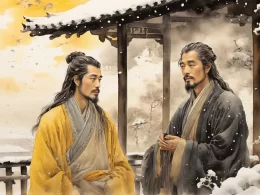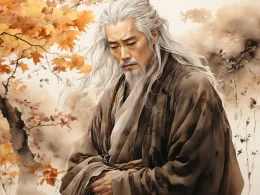While young, I had social relation cold,
And only indulged in six classics old.
Now I am nearly forty years of age,
But life does not turn for me a new page.
I did not fear all my life to be poor.
Could I suffer from hunger any more?
My wretched cottage hears grievous wind pass;
My front yard buried in weeds and grass.
I don my coat to stay the long, long night;
My cock won't crow to welcome morning light.
If ancient connoisseur Meng were near me,
To tell him what I feel I would be free.
Original Poem
「饮酒 · 其十六」
陶渊明
少年罕人事,游好在六经。
行行向不惑,淹留遂无成。
竟抱固穷节,饥寒饱所更。
弊庐交悲风,荒草没前庭。
披褐守长夜,晨鸡不肯鸣。
孟公不在兹,终以翳吾情。
Interpretation
Written in Tao Yuanming's later years, this introspective poem surveys his lifelong aspirations and struggles. It laments youthful ideals compromised by worldly failures while expressing profound loneliness and yearning for kindred spirits. Blending sincerity with quiet dignity, its poignant verses reveal both the bitterness of poverty and the steadfastness of principle.
First Couplet: "少年罕人事,游好在六经。"
Shàonián hǎn rénshì, yóu hǎo zài liùjīng.
In youth I shunned mundane affairs, Devoted to Six Classics' wisdom shares.
This establishes the poet's early commitment to Confucian classics over worldly pursuits, framing his life's intellectual and moral trajectory.
Second Couplet: "行行向不惑,淹留遂无成。"
Xíng xíng xiàng bù huò, yān liú suì wú chéng.
Years marched toward forty's gate— Yet lingering brought no achieved state.
"Lingering" (淹留) suggests career stagnation, with "no achievement" (无成) conveying deep regret about unfulfilled potential despite reaching maturity ("forty's gate").
Third Couplet: "竟抱固穷节,饥寒饱所更。"
Jìng bào gù qióng jié, jī hán bǎo suǒ gēng.
Still clinging to principled need, Hunger and cold became my creed.
"Principled need" (固穷节) epitomizes Tao's commitment to integrity despite poverty, with "creed" (饱所更) ironically elevating hardship to spiritual discipline.
Fourth Couplet: "敝庐交悲风,荒草没前庭。"
Bì lú jiāo bēi fēng, huāng cǎo mò qián tíng.
My thatched hut grieves with mournful breeze, Wild grasses drown the courtyard's ease.
Nature mirrors inner desolation—the "mournful breeze" (悲风) and overgrown courtyard (荒草) externalize emotional and material decay.
Fifth Couplet: "披褐守长夜,晨鸡不肯鸣。"
Pī hè shǒu cháng yè, chén jī bù kěn míng.
Coarse-clad through endless night I wait— Dawn's rooster refuses to articulate.
The "unwilling rooster" (鸡不肯鸣) symbolizes hope's deferral, transforming a literal night into metaphysical darkness where even nature withholds comfort.
Sixth Couplet: "孟公不在兹,终以翳吾情。"
Mèng gōng bù zài zī, zhōng yǐ yì wú qíng.
No Meng Gong here to understand— Thus my true feelings stay unmanned.
The reference to Meng Gong (a legendary appreciator of recluses) underscores unbearable isolation, with "unmanned feelings" (翳吾情) suggesting stifled self-expression.
Holistic Appreciation
"Wine-drinking Song XVI" stands as an intensely autobiographical work where Tao Yuanming traces his life journey from youth to old age with unadorned simplicity. From his youthful devotion to the Six Classics, through midlife struggles and unfulfilled ambitions, to his elderly commitment to principle and eventual solitude, the poem progresses with remarkable emotional depth. Each concise verse builds upon the last - from aspirations to adversities, from material hardships to spiritual anguish. The poignant line "Meng Gong is no longer here" particularly resonates, expressing the poet's profound loneliness in his search for a kindred spirit that remains unfound.
Artistic Merits
This poem masterfully blends personal narrative with lyrical meditation, achieving remarkable authenticity through its natural tone. Tao employs powerful contrasts and symbols throughout - juxtaposing the harsh reality of poverty against the bleak natural surroundings, the image of "clad in coarse hemp keeping night vigil" against the "rooster refusing to herald dawn" - all progressively revealing his inner melancholy and noble isolation. The concluding lament about finding no spiritual companion both deepens the thematic concern and creates universal resonance. Though linguistically unembellished, the work carries profound philosophical weight, standing out among Tao's oeuvre as a rare life-summarizing masterpiece.
Insights
This poem offers profound insights into the human condition: that the divergence between ideals and reality in life's journey doesn't render steadfastness to one's original aspirations and acceptance of humble circumstances a failure. Through his lived example, Tao Yuanming demonstrates that true worth lies in spiritual freedom and moral fortitude. His yearning for a "kindred spirit" reminds us of the inestimable value of finding someone who truly understands and believes in us. The work ultimately affirms that even in material deprivation, one can maintain inner peace and self-respect.
Poem translator
Xu Yuanchong (许渊冲)
About the poet

Tao Yuanming(陶渊明), 365 – 427 CE, was a poet, literary figure, fu writer, and essayist active during the late Eastern Jin and early Liu Song dynasties. Born in Chaisang (near present-day Jiujiang, Jiangxi Province), he pioneered a new genre of pastoral-themed literature, expressing profound philosophical insights through simple language. His poetic style became an enduring aesthetic standard in classical Chinese poetry.












